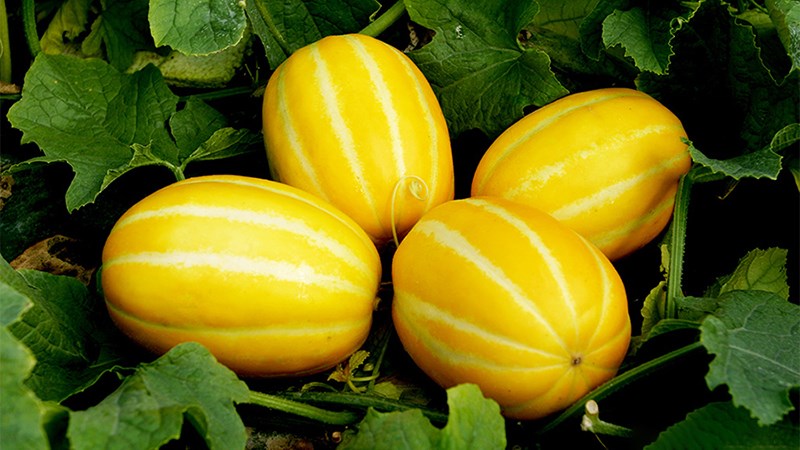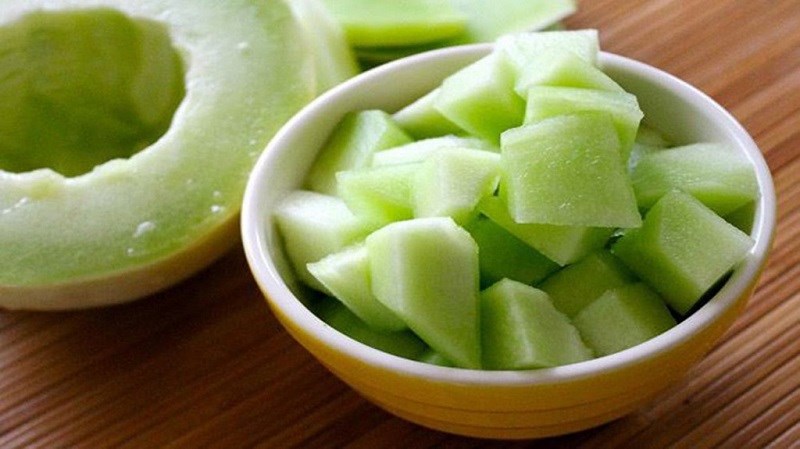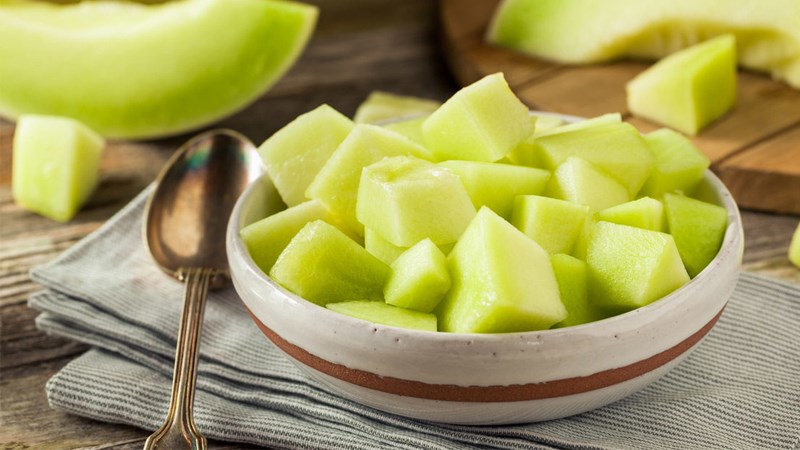 News
News
Melon melon, also known as golden melon, has the scientific name Cucumis sativus var.conomon and belongs to the Gourd family . Melons are native to Africa, India and Iran. People discovered the first melon plant grown in Iran about 5000 years ago, while in Greece and Egypt about 4000 years ago.

The melon plant is in the form of a bovine, creeping with tassels and appears stiff white hairs on the stem. Leaves are single and the surface of the leaf blade is hairy. Melon flowers are yellow, purple, ... depending on the type, the fruit size is 20 - 30cm when ripe. The seeds inside are gray-white with a size of 5-8mm.
The flesh inside the melon is succulent, sweet and contains a large amount of healthy vitamin C.

Melons contain up to 95% water, in addition to fiber , protein , carbs , fat . The use of melon is not only a fruit for dessert but also brings many health benefits such as:
Melon contains lutein and zeaxanthin , two prominent antioxidants that protect eye health and help prevent age-related macular degeneration.
Specifically, the results of a study published in 2009 demonstrated that zeaxanthin and lutein in melons can help protect the eyes from damage related to macular degeneration.

Many compounds in melon fruit are beneficial to the health of people who are suffering from asthma. For example, beta carotene is found in melons as well as yellow and orange fruits. Meanwhile, researchers have proven: consuming large amounts of beta carotene can help prevent asthma.
In addition, the content of vitamin C in this fruit also has strong antioxidant properties, so it has the ability to fight and prevent asthma effectively. Some experts have even suggested taking vitamin C supplements during the treatment of this disease.
Besides, it has also been discovered that another antioxidant - called choline , can effectively reduce inflammation in the body.

Thanks to its fiber, vitamin C, choline and potassium content , cantaloupe becomes one of the heart-healthy fruits.
The evidence is that according to the American Heart Association, it has been recommended that the adult body consume about 4700mg of potassium per day to help keep the cardiovascular system healthy. One cup of cantaloupe can meet 10% of the recommended daily intake of potassium.

Antioxidants like tocopherol and beta carotene in melon can prevent cell damage caused by oxidative stress .
Many studies show that taking these supplements along with other antioxidants can reduce the risk of prostate cancer, lung cancer and some other types of cancer. Not only that, the fiber content in melons can protect you from colorectal cancer.

Melons contain a lot of water along with electrolytes like potassium, sodium , magnesium and calcium . Therefore, adding melon to the diet will help the hydration process in the body take place stronger, which is beneficial to health on hot and sunny days or after exercise.

The fiber in melon helps you control hunger and supports effective weight control. Moreover, the calorie content in this fruit is very low and the fat is almost very little (or no) so it is very suitable for those who have a diet.
The main ingredient in melon is water with a large amount of fiber. These are two factors that help your body prevent constipation as well as promote a strong digestive system.

Beta-carotene, phytochemicals and vitamin C in melon have the ability to inhibit the activity of free radicals , while helping to promote immune system health - promoting the production of white blood cells to remove harmful bacteria or foreign bodies from the body.
In particular, vitamin C also plays an important role in the repair and development of tissues in the body, supports the formation of collagen as well as acts as an antioxidant to reverse aging.

The potassium content in melon acts as a vasodilator, thereby helping to relax blood vessels and regulate blood pressure. The presence of this mineral also improves the flow of blood and oxygen to the brain, helping the body to reduce stress and anxiety.

The habit of using melon is also one of the secrets to keeping the body healthy. For example, the calories in melon can be burned quickly in just about 30 minutes of walking.
Moreover, it was also discovered: melon contains many enzymes that do not need the digestive enzymes of the pancreas to act on.

Thanks to its cooling properties, melons are effective in cooling the body and making the body feel more comfortable on hot days. In addition, it also helps to quickly improve the symptoms of pain and discomfort when suffering from heat in the mouth.

Melon is cold, cool and contains many nutrients, so this fruit is extremely good for pregnant women. Besides, melon also contains an abundant amount of water to help the pregnant woman's body replenish the necessary amount of water.
However, for the dosage used, you still need to consult a nutritionist to avoid abuse that will affect the health of yourself and the fetus.

Despite its sweet taste, eating a lot of melons can help lose weight effectively if you follow a reasonable diet and exercise.
The energy in melon is very low, so no matter how much you eat melon, the body can only absorb a relatively small amount of calories. Therefore, when eating this fruit, you will feel full for a long time and control calories effectively.

As mentioned, in melon contains a lot of vitamin A , vitamin B and vitamin C, so it will have a good effect in helping to whiten and pink skin, reduce acne and freckles.
You can combine eating and applying a melon mask daily to quickly get the desired results.

Thanks to 95% water and rich in vitamin C, eating melon is very good for the excretory system. You can eat directly, blend or use melon to cook soup.

Although melon has a lot of health and beauty benefits, you should not abuse it because this can unintentionally cause a few unwanted side effects:

In addition to eating directly from the fruit melon, you can also processing melon into delicious dishes such as crepes melon , creamy melon , vitamin melon or melon pickled yellow brittle is also very attractive for You and your whole family enjoy!
